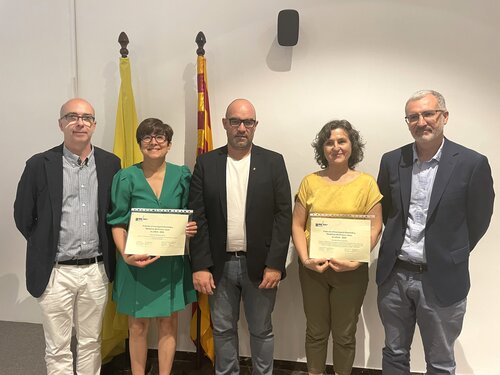Grants awarded for two projects in the High Pyrenees and Aran to study conscientious objection to euthanasia and the prevention of accidents in the practice of physical activity and sport
This is the second edition of the call for Biomedical Research Projects, High Pyrenees and Aran modality of the IRBLleida, financed by the Diputació de Lleida and promoted by Salud
A project to study conscientious objection and other types of objections by healthcare personnel to requests for assistance in dying following the entry into force of Organic Law 3/2021 on the regulation of euthanasia and another on the prevention of accidents in the practice of physical activity and sport have been the winners of the second edition of the Biomedical Research Projects, Modality High Pyrenees and Aran of the Biomedical Research Institute of Lleida (IRBLleida), funded by the Diputació de Lleida and promoted by the Department of Health. The two grants were awarded today, 14 June, at a ceremony in Tremp.
The aim of this grant is to introduce professionals from the Alt Pirineu and Aran Health Region to the field of research in order to promote biomedical research that reaches and adapts to the idiosyncrasies of the territory. The grants, which will last one year, are endowed with €5,000 each.
The main objective of the first award-winning project is to analyse knowledge and attitudes related to conscientious objection and other types of objections to requests for euthanasia. "The fact of disseminating the results and conclusions obtained in this study in the hospitals of the Alt Pirineu and Aran Health Region, with the elements of reflection that will be provided on the subject, will serve to provide professionals with more elements of judgement when it comes to whether or not to accept conscientious objection", explained the researcher Rosa Maria Pérez.
The second grant project aims to obtain an initial cut in time to make a descriptive reading in the period of one month (August 2024) in which all medical actions in the territory will be reviewed: visits to primary care centres, visits to the reference hospital (emergency department) and transfers. The head of the study, Montserrat Romaguera, explained that "getting first-hand information on what happens in sports accidents in the Pyrenean counties *pallareses can be the spearhead to have an extrapolated idea of what happens in the health region, and also in the counties of neighbouring Pyrenean territories, such as the eastern Pyrenees and the Aragonese and Navarrese Pyrenees".
At the award ceremony, held today in Tremp, the manager of the Upper Pyrenees and Aran Health Region, Miquel Abrantes, expressed his satisfaction at the fact that the awards have reached their second edition, which, he said, "are an incentive for professionals and a great gain for the region, as they allow us to address the specific needs of the Pyrenees and, at the same time, show that quality research can also be carried out far from the big cities and large hospitals".
For his part, the director of IRBLleida, Diego Arango, explained that "this is a grant designed to bring to the surface incipient biomedical research initiatives beyond the campus of the Arnau de Vilanova University Hospital, which is where the bulk of the activity in this field takes place, and that new lines of research specific to the region can emerge". In this sense, Arango added that "the idea is for the grants to serve as a seed for these lines of research to grow and become increasingly ambitious".
In this second edition of the awards, the results of the two projects of the first edition were also presented. Evaluation and rethinking of the reperfusion strategy in STEMI in the High Pyrenees and Aran', by Montse Navarra, is assessing whether the coronary reperfusion treatment performed in stroke codes in remote rural areas such as the High Pyrenees is the most appropriate, according to the recommendations of current European guidelines. For its part, the study 'Efficacy and feasibility of abdominal aortic aneurysm screening from Primary Care' by Pau Surribas, has evaluated the feasibility of abdominal aortic aneurysm screening, an abdominal ultrasound that uses sound waves to see the inside of the abdominal region.
From the Diputació de Lleida, Marc Baró, deputy and mayor of La Pobla de Segur, stressed that "in health, prevention is essential, and that is why we must have scientific research tools such as those provided by the IRBLleida. Tools that help us to better understand life and its inevitable cycle of deterioration; how we face it, how to make it less painful for people and how we integrate it into our daily lives. For this reason, we are proud to fund these grants in the Pyrenees”.
Commitment to research
This commitment of the Alt Pirineu i Aran Health Region to research is reflected in its Health Plan 2021-2025, which considers research as a lever for change in the health system and includes a specific axis focused on research and innovation aimed at addressing the needs of health and the system. Moreover, in Catalonia, research and innovation are framed within the Strategic Plan for Research and Innovation in Health (PERIS), in which research and innovation are considered as drivers of transformation that provide solutions to people's health problems through the integration and generation of knowledge.

The institutional representatives and the authors of the projects awarded grants under this call for proposals






